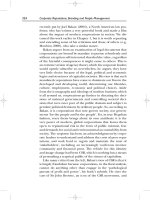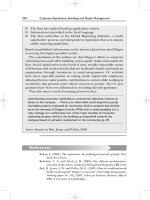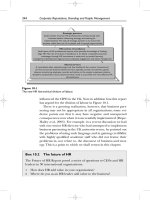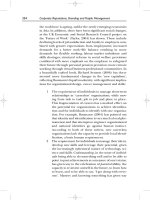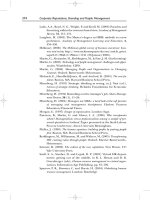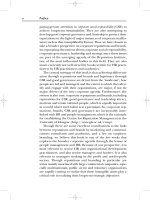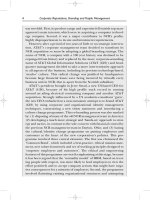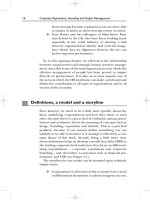Tài liệu Corporate Reputations, Branding and People Management 2 ppt
Bạn đang xem bản rút gọn của tài liệu. Xem và tải ngay bản đầy đủ của tài liệu tại đây (107.49 KB, 10 trang )
paying greater attention to corporate social responsibility (CSR) to
achieve long-term sustainability. They are also attempting to
develop good corporate governance and leadership to protect their
reputations in the light of major instances of corporate malfea-
sance such as that exemplified by Enron. Thus, we have chosen to
take a broader perspective on corporate reputations and brands,
incorporating discussions about corporate social responsibility,
corporate governance, leadership and strategy, since these issues
are part of the emerging agenda of the Reputation Institute,
one of the most influential bodies in this field. They are also
issues currently not well served by books written for HR practi-
tioners by HR practitioners and academics.
The central message of this book is that achieving differenti-
ation through reputations and brands and legitimacy through
CSR and good governance are driven from the ‘inside-out’; how
people are led and managed, and the extent to which they iden-
tify and engage with their organizations, are major, if not the
major, drivers of the new corporate agenda. Furthermore, the
reverse is also true: corporate reputations and brands, including
reputations for CSR, good governance and leadership attract,
motivate and retain talented people, which is equally important
in a world where such talent is at a premium. So, corporate rep-
utations, brands, CSR and governance are inextricably inter-
linked with HR and people management, which is the rationale
for establishing the Centre for Reputation Management at the
University of Glasgow ( />Though there are some excellent contributions to the links
between reputations and brands by marketing and communi-
cations consultants and academics, and a few on employer
branding, we believe this book is one of the few works that
explores the broader corporate agenda through the lenses of
people management and HR. Because of our perspective, it is
most relevant to senior HR and organizational development
practitioners, and also senior managers and leaders. It is also
relevant to managers working in the profit and not-for-profit
sectors. Though reputations and branding in particular are
terms usually associated with large commercial companies, espe-
cially multinationals, public sector and voluntary organizations
are rapidly coming to realize that these intangible assets play a
critical role in realizing their long-term strategic objectives.
x Preface
Although we have written the book primarily for practitioners,
hopefully containing practical advice, it is not a ‘how-to-cook’
book. We believe that many senior practitioners are best served
by, and are looking for, an analytical, critically reflective and
multi-disciplinary approach to this emerging corporate agenda.
So we have drawn on a wide range of topics – organizational
behaviour, marketing, HRM, economics, communications, CSR
and leadership studies – to make our case. The book is also
grounded in recent research and practice, including a number
of originally-researched cases by ourselves and others from
the UK, USA, Europe and Asia. Among the issues we have cov-
ered are:
■ The elements of corporateness and the corporate
agenda: corporate reputations, brands, social respon-
sibility, governance, strategy and leadership
■ The role of reputations and branding in achieving
business and organizational success
■ Organizational identities and images, and their rela-
tionship to the quality of individual employment rela-
tionships and organizational actions
■ The role of people management, strategic HR and
organizational communications in shaping reputa-
tions and brands
■ The ‘business case’ for CSR
■ Corporate governance and leadership
■ The future of HR and the emerging corporate agenda
We have tried to write in an accessible style, using the first person,
and, at times, reflecting on our own experiences and careers to
make important points. Previous readers of our work have sug-
gested this helps put some life behind the text. Above all, we
have tried to be provocative and to provide an agenda for HR
that addresses its own, perennial reputation problems; having
spent so long in HR careers, it’s time to pay something back.
Graeme Martin and Susan Hetrick
Preface xi
This page intentionally left blank
Acknowledgements
The impetus for this work began in 2003 following research
conducted for the CIPD on the links between branding and
HR. When we first met, we debated the role of the HR function
in creating and sustaining corporate reputations and brands, a
topic that was almost entirely approached from a marketing
and communications viewpoint. From our own perspectives
as an academic and as a practitioner, we began our journey
to explore how people strategies are, and will continue to be,
among the most important assets that differentiate success from
failure in organizations in all sectors of advanced economies.
Any book is the outcome of the efforts of a number of
people: from developing our ideas and challenging our assump-
tions through to providing organizational insights and case
material. Consequently, we would like to thank the authors
whose work has informed our ideas and the practitioners who
have kindly donated their time to speak to us. In this context,
we are especially grateful to those people who have endorsed
this book, others who have provided some of the intellectual
inspiration and some of the practitioners who have assisted
with the research. These include, in alphabetical order: Alison
Allan, Greig Aitken, Simon Barrow, Duncan Brown, Sandra
Burke, Chris Brewster, Karen Carlton, Anna Commachio, Alma
Caldwell, Wayne Cascio, Thomas Clarke, Leslie de Chernatony,
Grahame Dowling, Helen Francis, Charles Fombrun, Annette
Frem, Ian Gray, Paul Goldsmith, Geraldine Hetherington,
Norma Hogg, Irene Johnstone, Liz Kelly, Robin Kramar,
Linda McDowall, Jim McGoldrick, Colin McLatchie, Johanne
Malin, Colin Moreland, Richard Mosley, Alan Murdoch, Neil
Roden, Lynn Rutter, Anne Sloan, Martyn Sloman, Sue Smith,
Paul Sparrow, Mary Spillane, Gordon Teasdale, Susan Thom,
Anthony Thomson and Stephen Young. Particular thanks must
go to our research assistants and colleagues – Ros Doig, Synove
Granly, Martin Reddington and Christine Smith – who have
been incredibly valuable in helping us put together material
for the book and who have helped with some critical reading
of the text. In addition, we would like to thank the companies
and managers in the UK, Poland and US, who supported
Susan's doctoral research and informed our thinking on global
companies, as well as the large number of organizations and
blue-chip companies that we have worked with over the past
twenty years.
You will also see numerous references to our close colleagues,
associates of the Centre for Reputation Management through
People at the University of Glasgow’s School of Business and
Management, Phil Beaumont, Judy Pate and Hong Zhang. We
owe these friends an enormous debt for their work over the
years and for sharing the burden of writing associated material.
We also wish to thank Edinburgh Business School at Heriot
Watt University for giving us permission to use material written
for their distance learning masters degree programme, espe-
cially Alex Scott, Alex Roberts and Charles Ritchie for their help.
Without the excellent team at Butterworth-Heinemann –
Maggie Smith, Claire Hutchins, Olivia Warburton, Melissa Read
and Elaine Leek – this work would not have been possible.
They have been a great team to work with and could not have
done more to make the process smooth and effective.
Finally, we both have young families and would like to thank
them and our respective spouses for their support.
xiv Acknowledgements
